Sometimes it can be hard to get your family to sit down and play games together—particularly when the games you have take several minutes to set up and an hour or more to play.* Here are seven games that are easy to set up, quick to play, and (mostly) small enough to tote: perfect for a quick game at home or on the road.
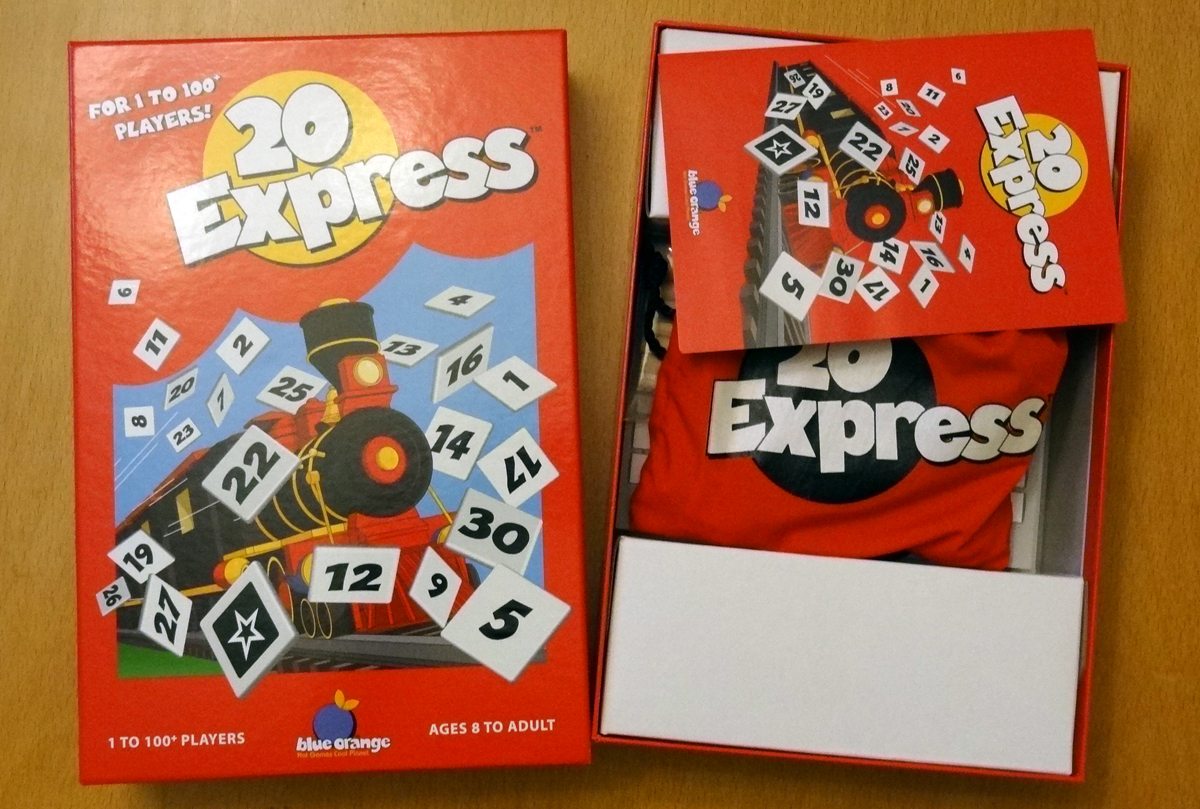
20 Express
Okay, the box cover for 20 Express (from Blue Orange Games) is my least favorite part of the game (probably followed by the look and layout of the scoring sheet, which is much bigger than it needs to be). However, behind this unassuming facade is a crazy-addictive game. Whenever I teach this game, I just assume I’ll be playing several rounds in a row.
The game components are very simple: a cloth sack with a pile of 40 number tiles, several small golf pencils, and a pad of scoring sheets. The tiles are nice and chunky, with the numbers engraved and not just printed, so they won’t rub off. The numbers go from 1 to 30, with two copies of 11 through 19 and one wild. The box says the game is for 1 to 100+ players, and I suppose you could do that, though I’ve only gone up to about 8 myself.
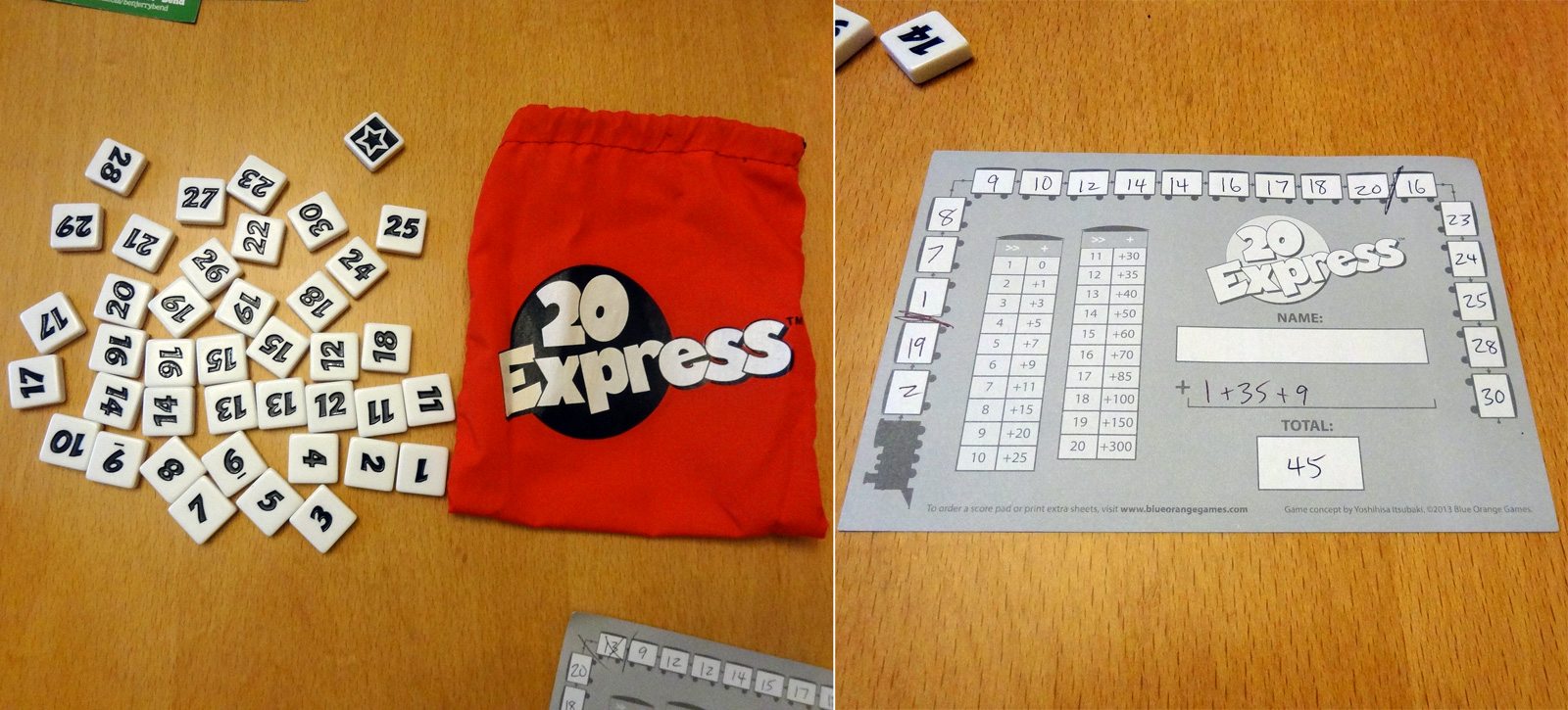
Here’s how you play: Dump all the tiles in the bag and give everyone a score sheet. Draw numbers out of the bag one at a time. Everyone has to write each number in a box on the scoring sheet (in the train going around the edge) as it’s drawn. Once twenty tiles have been drawn and all the boxes are filled, you mark off your train wherever the numbers decrease. You’re trying to make the longest chains of increasing (or equal) numbers—the longer the chain, the more points you get.
It seems like a really simple idea, and it is, but it’s a lot of fun. One person I played with remarked that it’s like strategic bingo—yes, there’s a lot of luck involved in what numbers are drawn, but you get to decide where to put those numbers. So far the longest chain I’ve seen was 16 in a row (beating out my 15!).
20 Express retails for $19.99, is recommended for ages 8 and up, and is for 1 to 100 players. One round plays in less than 5 minutes.
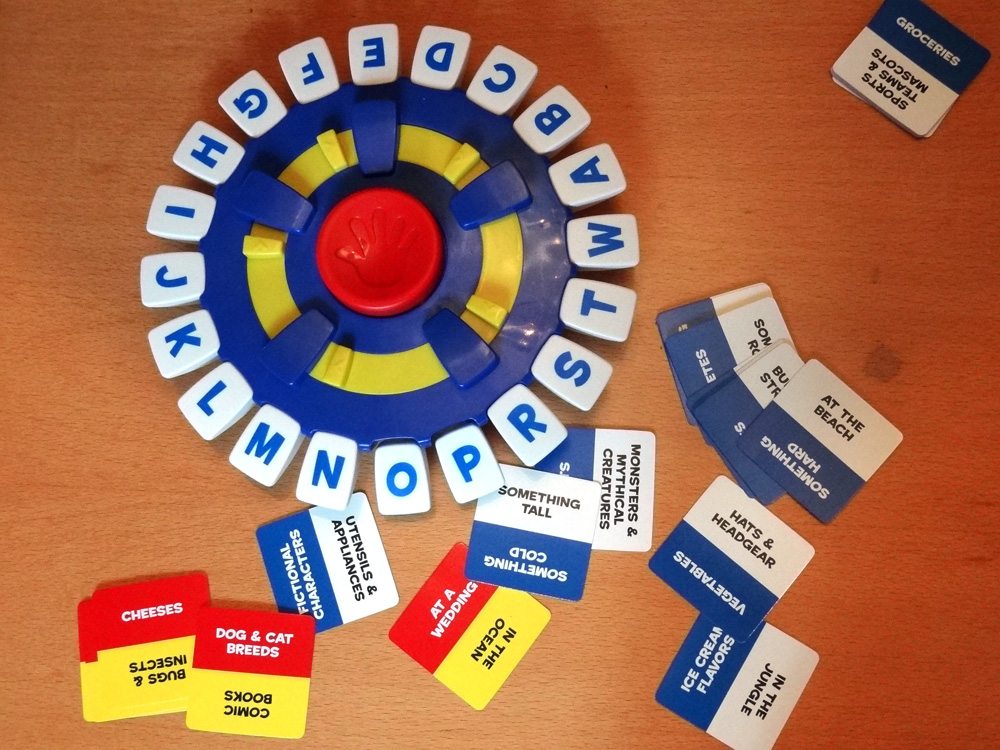
Tapple
Tapple is a quick word game from USAopoly that uses a plastic letter wheel. The wheel has a big red button in the middle that starts a 10-second timer (that ticks loudly and then CLANGS at the end). There are also 20 letter tabs around the side (omitting Q, U, V, X, Y, and Z) that stay down when you tap them, and then a yellow release ring that pops the letters back up. The 36 category cards have two categories on each side—the red/yellow side is a bit harder and the blue/white side is a bit easier. All of the cards store in a handy compartment on the bottom of the disk, and it uses 2 AA batteries. Although the wheel isn’t tiny (about 9″ across), it’s self-contained so it’s pretty easily transported.
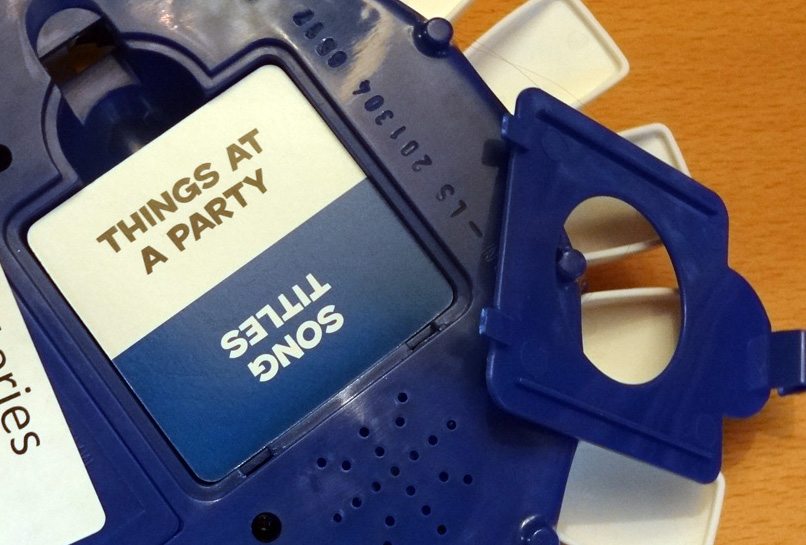
You draw a card to pick a category, such as types of fruit or colors or things at a party. Then each player hits the big red button and tries to think of something in that category. You say the word, tap the letter, and hit the red button to reset the timer for the next player. Each player has to use a letter that hasn’t been used yet—run out of time, and you’re eliminated for the round. Play until one player is left—that player gets the card, and you reset the wheel for the next round.
Tapple is quick and plays off the fact that when you’ve got a ticking timer your brain freezes up and you can’t think of words like “grape.” You can play any number of rounds, and my kids have taken to playing it with each other (or even by themselves). I love that it’s getting my 6-year-old to think more about spelling, although I’ve overheard some pretty debatable answers like “jungle penguins” for “things in a jungle.” Hmm, where’s that game that teaches biology?
Tapple retails for $19.95, is recommended for ages 8 and up, and is for 2 to 8 players. It plays in 10-20 minutes, though you can easily adjust the number of rounds.
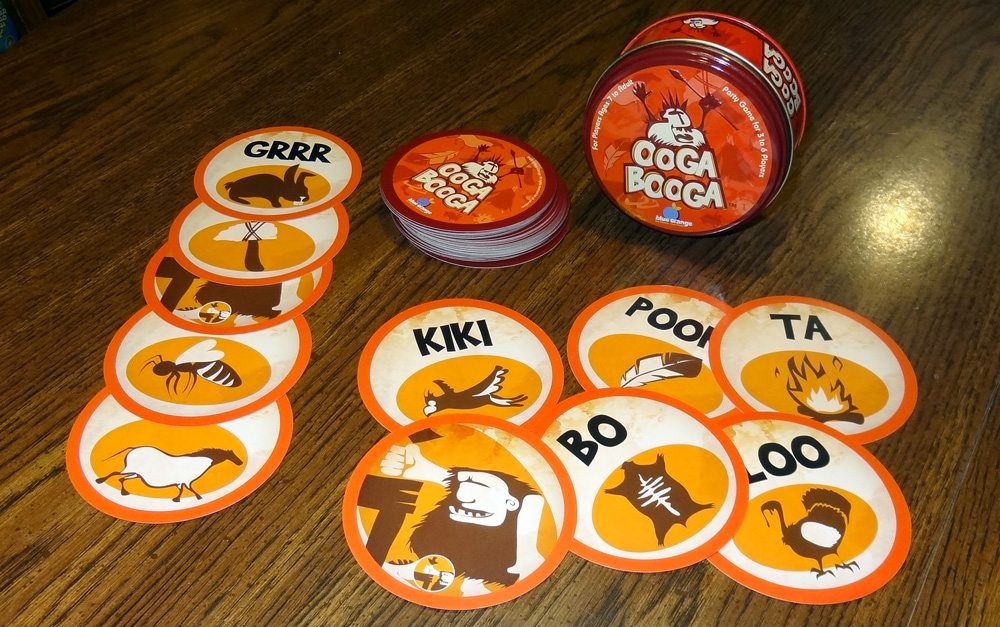
Ooga Booga
Ooga Booga from Blue Orange Games requires you to lose your inhibition a little bit and act silly—but it’s worth it. It’s a game of memory and talking like a caveman, and your kids may very well be better at it than you, especially if you’re too busy worrying about how you sound. The game comes with 54 circular cards in a little round metal tin (similar to Blue Orange’s Spot It series, which is also excellent). Each card has an image and a caveman word on it or an image of an action with a little icon on the bottom. Everybody is dealt a pile of cards (depending on number of players) and the goal is to get rid of all your cards first.
The first person plays their top card and says the word, ending with “Ha!” and pointing to the next player. Then each successive player must add a card, which then overlaps the word on the previous card (as you can see on the left side of the photo above). They must then recite the whole chain, ending with “Ha!” Some of the cards have actions, like pounding the table, clapping, or sticking out your tongue. Make a mistake, and you have to take three of the cards and then the chain resets. You can also play the advanced version in which you cover up the entire card rather than showing the picture clues—but we haven’t evolved to that stage yet.
Ooga Booga retails for $12.99, is recommended for ages 7 and up, and is for 3 to 6 players. It plays in about 10 minutes.
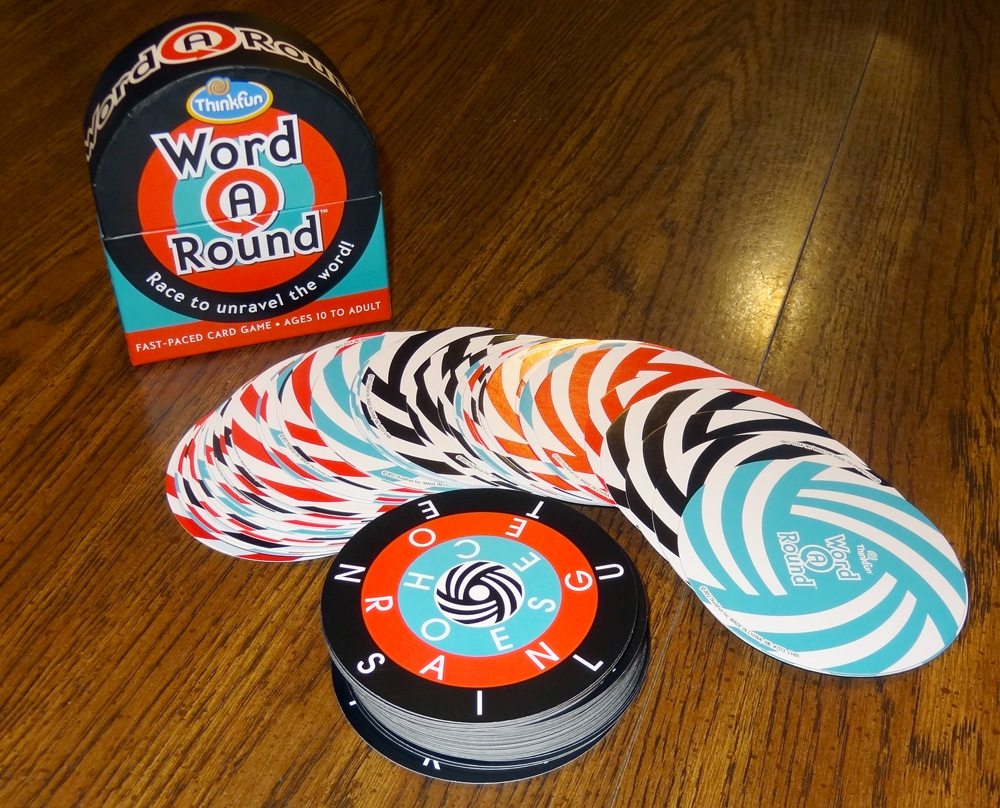
WordARound
WordARound from ThinkFun is another quick word game. You get 100 round cards with three words printed on each card—but the words go around in a circle, with nothing to indicate which is the first letter of the word. You uncover the card, and everyone tries to figure out what the word is. Once you’ve figured it out, you call out the word, take the card, and then flip it over. The backs of the cards are black, red, and blue, corresponding to the three rings of words. That tells you which color to look at for the next word.
The game is for two or more players—basically as many as you can fit around the stack of cards—and it goes until somebody has collected 10 cards, so it’s pretty fast. Of course, what you realize is that sometimes you’ll stare at a card and have no idea what it says. “Ensilute? Siluten?”
WordARound retails for $12.99, is recommended for ages 10 and up, and is for 2 or more players. It plays in under 10 minutes.
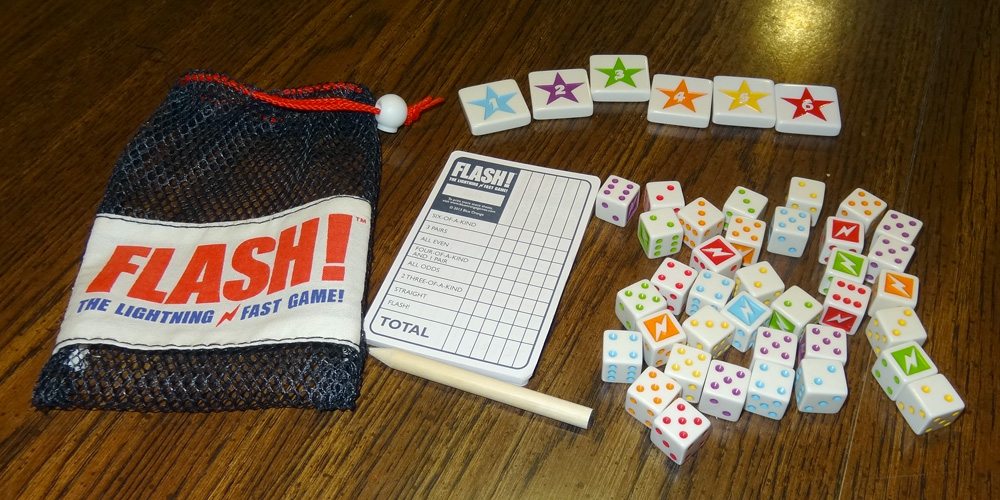
Flash!
Flash! from Blue Orange Games is like speed Yahtzee. Each player gets a set of 6 dice. The scoring tiles are stacked so that the highest number is on top (you use one tile per player). One player will choose a challenge on the scoring sheet (e.g., “all even” or “3 pairs” or “straight”) and then everyone rolls and re-rolls their dice simultaneously, trying to get the combination. As soon as you get the right dice combination, you grab a scoring tile. Once everyone has a tile, score points for the tile you grabbed, and then start a new challenge.
After each challenge has been completed once, you tally up scores, and see who won. There are also a couple of variant rules: Freestyle Flash lets each player choose individually which challenge they want to go for, but they can only score once for each challenge. The other variant, Speed Flash, is the same as the original but the last place player is eliminated, so you don’t keep score and you just play until only one player is left.
The dice are fun: colorful six-sided dice with a lightning bolt in place of the 1 that functions as a wild. It all comes in a little mesh travel bag along with a golf pencil for the scoring sheet, and the instruction sheet is small enough to throw into the bag as well. My only complaint is that the scoring tiles are colored to match the dice, which is confusing at first because most people think they’re supposed to get the tile of their color, rather than just take the highest remaining score.
If you like Yahtzee, this is a similar idea but everyone gets to play at the same time, which is fun and chaotic (and admittedly a bit noisy). Flash! retails for $14.99, is recommended for ages 7 and up, and is for 2 to 6 players. It takes about 10-15 minutes to play.
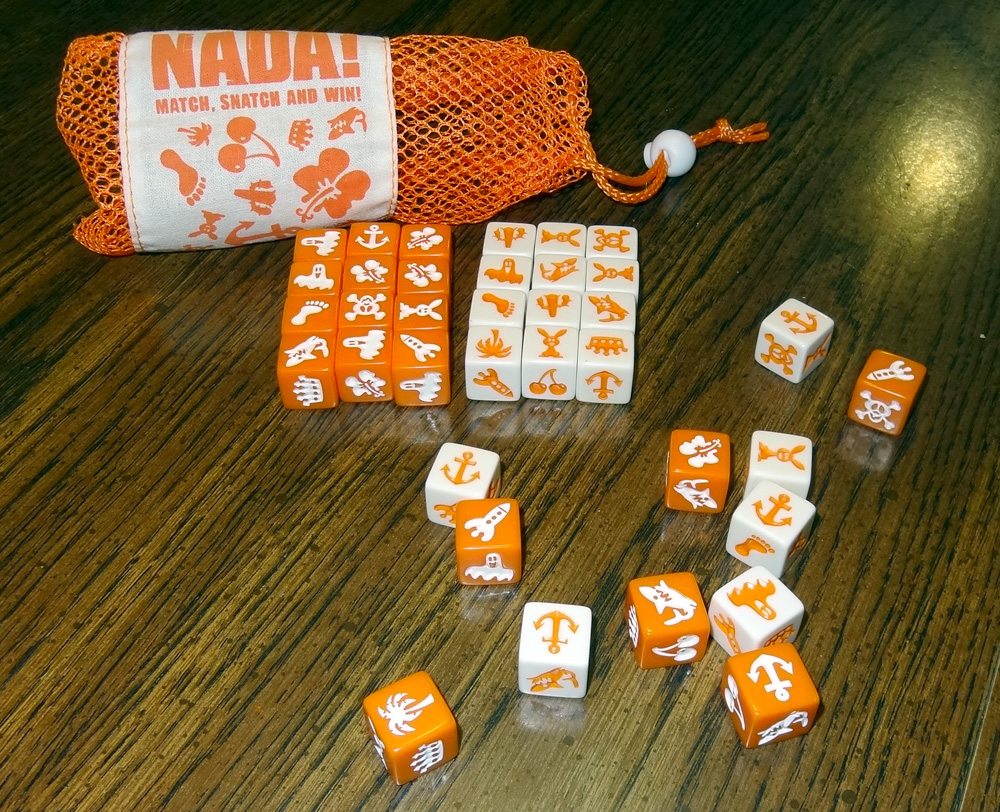
Nada!
Nada! is another portable dice game from Blue Orange Games, but the game play is a little more like Spot It. There are 36 dice—18 orange and 18 white—with a variety of different icons on them like anchors, palm trees ghosts, rabbits, and rockets, all in a little mesh bag. The game is played over 3 rounds.
To play, you grab 6 orange and 6 white dice and roll them on the table where everyone can see them. All of the players try to find a symbol that appears on both colors; spot a match, and you call it out and then take all of the dice showing that symbol. You roll the rest of the dice and do it again. If there are no matches, you shout “Nada!” and take all of the dice (once everyone has confirmed that you’re right). If you make a wrong call, you re-roll the dice and sit out the rest of the round. If all of the remaining dice are the same color then discard them. Once all the dice are gone, a new round begins with another set of 12 dice. After three rounds, the player who collected the most dice wins.
There are two variants included in the rules, one in which you have a personal bank of dice that you’ll roll into the pool and one in which you use all of the dice at once. Nada! is another fun one that’s easy to learn and can be fun for a quick game, though you need to make sure whoever’s rolling the dice isn’t scattering them too far.
Nada! retails for $14.99, is recommended for ages 7 and up, and is for 2 to 4 players. It plays in about 10 minutes.
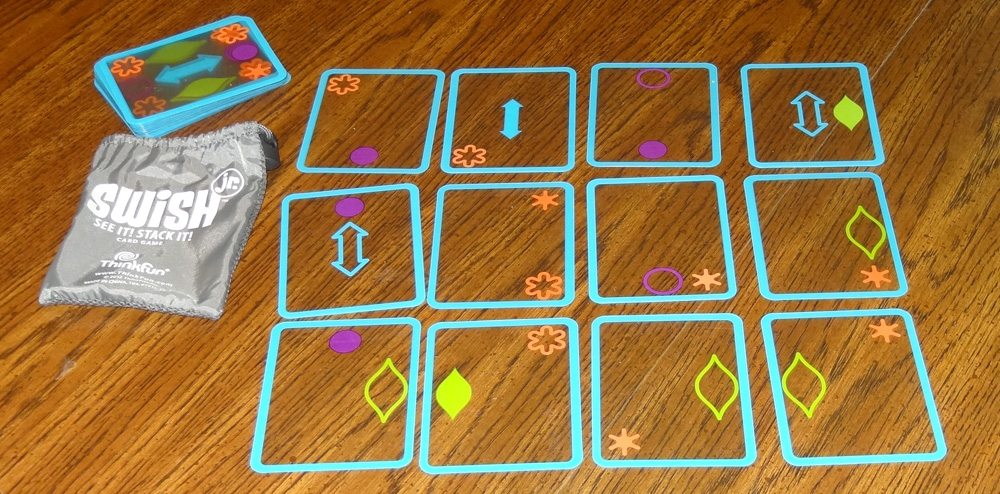
Swish Jr.
Swish Jr. from ThinkFun is another spot-the-match game, but with an interesting twist: the cards are clear and you have to be able to match shapes with their outlines. It’s the kid version of the original Swish, which has twelve circles instead of the nine varying shapes. The original is more challenging but they play essentially the same way. The game comes with 42 transparent plastic cards and a little pouch.
To play, you deal out twelve cards on the table, and everyone starts to look for a “swish.” That’s when you can take two or more cards and stack them so that all of the outlines are filled in with matching solid shapes. Cards can be rotated or flipped over, as long as they’re all oriented the same way vertically or horizontally. Once somebody spots a swish, they pick up the cards and layers them to confirm that it works, and then put them in a scoring pile. The cards on the table are replenished and the game continues. Whoever has the most cards at the end of the game wins.
There are penalties for calling “Swish” when you can’t find one or pick up the wrong cards, or for being too slow to pick up after calling. If everyone feels stuck you can replace four cards, but it’s pretty rare to have no matches at all.
The game is pretty interesting and can get more challenging if you say that you must have at least 3 or 4 cards in a swish. The maximum number of cards in a single swish is 9 (if you match all of the symbols) but it’s fun to build really big swishes if you can.
Swish Jr. retails for $12.99, is recommended for ages 5 and up, and can be played with any number of players that can fit around the table. If you want a bit more of a challenge, you can get Swish for $13.99, recommended for ages 8 and up. Both games take about 10-15 minutes to play.
So there you have it! A few games that can fit into even a busy schedule.
*Of course, if you do have the time and inclination, lengthy games are awesome, too! But these are great when you need to scratch that gaming itch but time is limited.
Disclosure: GeekDad received review copies of the games reviewed in this post.


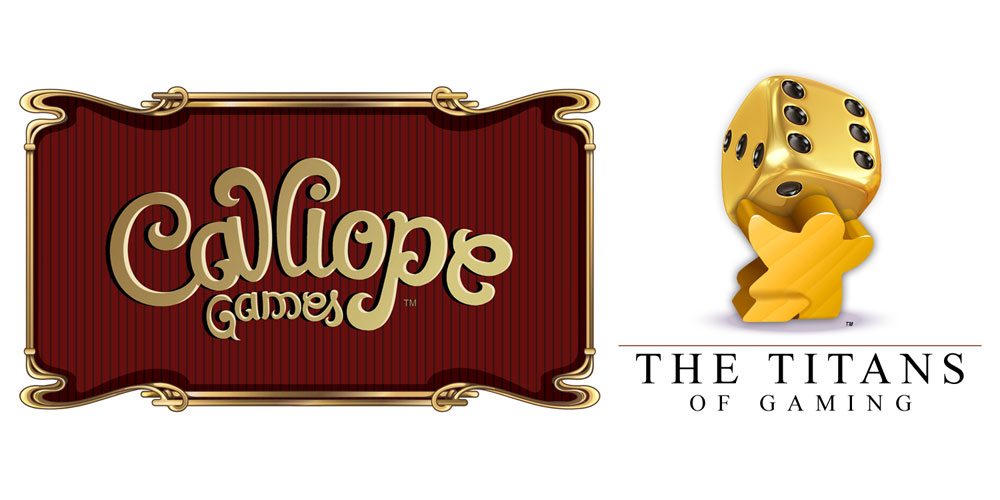

What awesome game recommendations. Glad your kids are enjoying Tapple and thinking more about spelling.
Also, WordARound is an office favorite, and the word you’re speaking of is utensil!
We love your great reviews!
– Team Tapple
Spot It! is another great game, similar to several above that has many variations and is great for young minds. We started playing it with my son when he was 5 (with some slightly modified rules).
http://www.blueorangegames.com/spotit/
Yes! I mentioned Spot It in the Ooga Booga section—the only reason it’s not here in this list is because I’d reviewed it in the past and these are new(er) games, but in general Blue Orange has some great selections for young gamers.
Love this article! My family (myself, husband, 12-year-old son) loves to play quick games some nights and we really enjoy dice games, which I see represented quite nicely here. I’m going to look over each game a little more thoroughly and add a few to our collection! Your articles are my favorite here because you focus on family fun/games.
Thanks! There really is something that’s fun about rolling a big pile of dice. As a fan of Yahtzee myself, I personally like Flash, but Nada is more similar to the Spot It series where it’s about visual perception rather than speed-rolling.